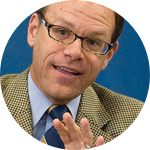About This Project
Politics has a well-known tendency to divide people. There are many causes of political disagreement, but one of the most powerful is ideology. Typically, we think of ideology in intellectual terms, as a set of beliefs. However, there is also an emotional component to it. Our study examines the power of this aspect of ideology by measuring subjects’ emotional responses to the mere mention of ideological terms such as “liberal” or “conservative.”Ask the Scientists
Join The DiscussionWhat is the context of this research?
Political scientists have long focused on reason as the primary factor when explaining why individuals hold liberal or conservative positions. Recent studies, however, indicate that other factors —personality, morals, and emotions— influence people’s political ideologies as well. Contemporary work that focuses on the influence of emotion on ideology is breaking new ground by empirically measuring emotional response as revealed through autonomic nervous system activity (e.g., sweat gland activity). This work suggests that an individual’s response to frightening or disgusting stimuli is related to his or her ideology, suggesting that reason alone does not tell the whole story. People’s emotions seem to play an important role too, but this relationship is not yet well understood.
What is the significance of this project?
Liberals and conservatives are more polarized now than they have been at any point in the last several decades. Why is this polarization so severe? Why do liberals and conservatives have such a hard time talking to each other? Emotion may be part of the problem. We know, for example, that heightened emotional states affect political attitudes. But we don’t know the extent to which politics influences people’s emotions. To explore the emotional impact of politics, we measure the extent to which people experience emotion when simply confronted with ideological terms. If we find that people have strong emotional reactions to such an everyday occurrence, it may be the case that emotion plays a larger role in ideological preferences – and political polarization – than once thought.
What are the goals of the project?
Our primary goal in the proposed study is to examine individuals’ emotional responses to ideological terms. We plan to recruit a community sample of 150 adult participants. Each participant will complete an experiment in which they will be asked to write about what the word conservative or liberal means to them. During the experiment, we will measure second by second changes in heart rate and skin conductance level – measures of autonomic nervous system activity that have been commonly used as indicators of negative emotion. This methodology will allow us to examine whether the presentation of a simple ideological term leads to significant increases in negative emotion. We will also be able to conduct analyses examining which types of individuals respond with the strongest emotions.
Budget
Gathering the information we need requires us to reach out to the local community to find a representative sample of subjects. Funding will help us recruit subjects from the community, schedule their visits to campus, and allow us to offer incentives to participate.
To make this project a success, we will need interviewers to contact community members and recruit them to the study. We will also need research assistants who will greet our subjects when they arrive on campus, explain the subjects’ roles and rights, properly connect our subjects to our laboratory equipment to properly monitor and record their physiological responses, and initiate, conduct, and monitor our experiment. None of these activities can take place without funding.
Meet the Team
Team Bio
David Ciuk is part of the political science department at Reed College. He studies various aspects of political behavior and psychology.Robert Friedrich is an associate professor at F&M. His interests include elections, statistics, and political ideology.
Stephen Medvic is professor of Government at F&M. He studies campaigns and elections, political parties, and public opinion.
Matthew Schousen is a professor at F&M. His scholarly interests include congressional elections and the US Congress.
Scottie Thompson is Postgraduate Research Fellow in the Center for Opinion Research at F&M. She focuses on statistical analysis and survey instrument design.
Allison Troy is an assistant professor of psychology at F&M. Her research focuses on emotion regulation, well-being, and resilience. This is her first foray into the exciting world of politics.
Berwood Yost is the Director of the Center for Opinion
Research at F&M. His interests include public opinion, research methods and public health.
David Ciuk
How do people decide whether they like or dislike something? Do people always make informed decisions, or do they act on hunches? For as long as I can remember, these questions have fascinated me, and their answers can help us build a solid understanding of various types of human behavior, including political behavior. To this point, my work has focused on the importance of values in the decision making process, the ways in which people use information, and how stereotypes affect attitudes. My work has appeared in academic journals, edited volumes, and I have presented at several conferences.
Lab Notes
Nothing posted yet.
Project Backers
- 5Backers
- 2%Funded
- $176Total Donations
- $35.20Average Donation






